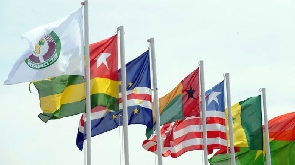 ECOWAS flag with that of member nations
ECOWAS flag with that of member nations
Countries in the West African sub-region are bearing the brunt of political instability in the region, the Economic Community of West Africa States (ECOWAS) has said.
According to the bloc, the five coup d’etat which had taken place in the four ECOWAS member states between 2021 and 2023, had contributed to uncontrollable increase in prices of market products such as onions and tomatoes, widely produced in Niger and Burkina Faso respectively.
“As a result of insecurity and instability, economic activities in the region have been disrupted”, Ambassador Mrs. Perpetua O. Dufu, the Coordinating Director, Multilateral and International Organisation of the Ministry of Foreign Affairs and Regional Integration stated.
She was speaking at the opening session of a day’s sensitisation workshop on ECOWAS protocols on Monday in Sunyani. Equally disturbing is the worsening humanitarian situation with the possibility of a further spillover of refugees into the country as well as the disruption of land and air travel across the region, Ambassador Dufu added.
The Ministry of Foreign Affairs and Regional Integration in collaboration with Media Response, a non-governmental organisation working to promote regional integration in the sub-region organised the workshop to sensitise state and non-state actors on the ECOWAS protocols and and benefits.
Ambassador Dufu indicated with widespread conflict and instability, economic prosperity could not be attained and sustained in the sub-region, as regional integration was intrinsically linked to peace and stability.
She said the region was currently at crossroads with many states witnessing severe cases of insecurity, conflict and violent extremism, which had been further exacerbated by the resurgence of unconstitutional changes of governments, bringing about political instability in some parts of the sub-region.
The Niger coup, of July 26, 2023, has therefore underscored the importance of safeguarding democracy and upholding democratic norms within the sub-region, Ambassador Dufu added.
Mad. Justina Owusu-Banahene, the Bono Regional Minister, observed the ECOWAS protocols offered a roadmap for tackling challenges such as border security and terrorism in the region.
“By collaborating with agencies of neighbouring countries, in our case La Cote d’Ivoire and regional partners, we can enhance intelligence-sharing, joint patrols and coordinated efforts to counteract potential threats,” she said.
The Regional Minister directed the members of the Regional Security Council (REGSEC) as well as Municipal and District Security Councils (MUSECs/DISECs) to study and be conversant with the protocols to help identify and tackle security threats in the region proactively.